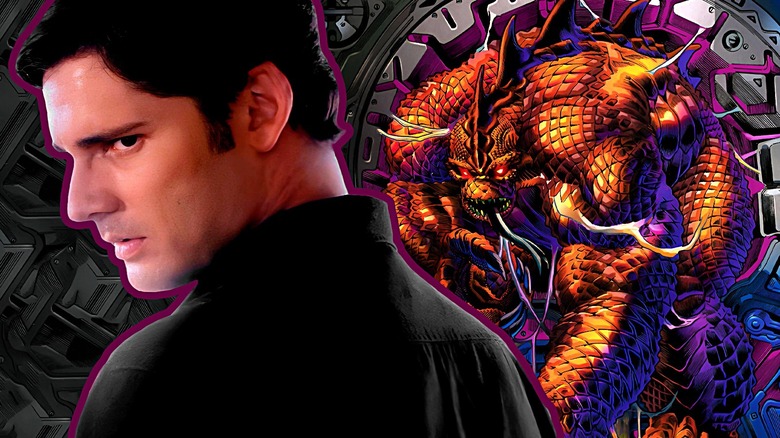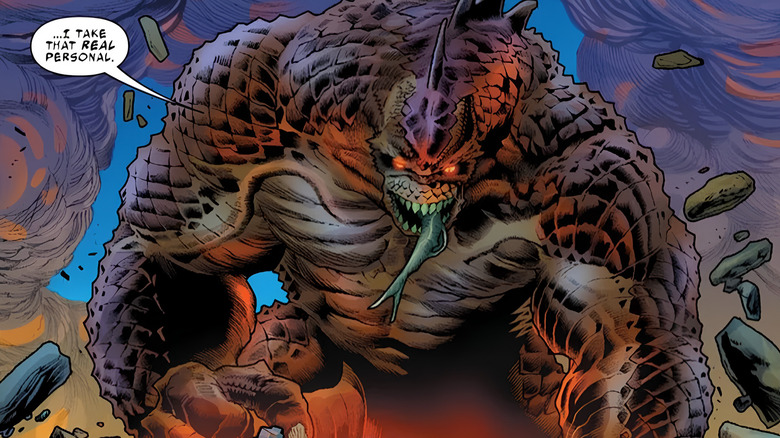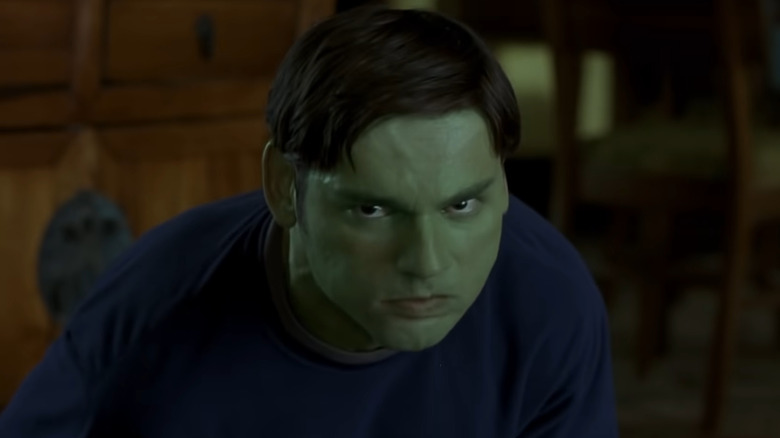Marvel Theory: The First Movie Hulk Isn't A Mutation - It's A Demonic Possession
Bruce Banner's superhero origin story is beyond well-documented in popular media. Long story short — he's a smart guy who builds a bomb for the US government and gets a face full of gamma radiation for his trouble. But instead of dying a gruesome and traumatic death, Dr. Banner transforms into a muscular behemoth, fueled by rage and base instinct. Although the particulars vary across different adaptations, it is broadly understood that Bruce and the Incredible Hulk are the same being, like Dr. Jekyll and Mr. Hyde. However, according to a Reddit theory, that's less true than it may seem.
On r/FanTheories, u/housepainterr suggested that "Hulk," Ang Lee's 2003 Universal Pictures film starring Eric Bana, swaps out scientific transformation for demonic possession. "Ang Lee's 'Hulk' always felt like a horror movie," they said. "The Hulk is a manifestation that Bruce had been suppressing all his life ... it was his suppressed childhood trauma that had kept the Hulk at bay for years ... instead of the radiation creating the Hulk (as usual), it only unleashed it. Opened a door or invited it ... [I think the Hulk] isn't an alter [ego] but an evil force the doctor keeps at bay."
The Redditor points to Lee's use of imagery as evidence, noting that the Hulk is often seen locked behind an abyssal door or peering out into the world through mirrors. While science fiction and the occult rarely mix, there's actually a canonical precedent for the Hulk being a demonic entity.
Bruce Banner suffers demonic possession in the comics
While it's true that most iterations of the Hulk depict him as Bruce Banner's scientifically personified anger issues, there's at least one version of the story that supports this Redditor's fan theory. In 2000, Marvel Comics introduced the Devil Hulk, and he's exactly what he sounds like. Bruce encounters the literal demon in his mindscape, a soul plane littered with struggling Hulk personalities. This version of Bruce contains many Hulks inside him, each fashioned to cope with a different trauma from his childhood, and sometimes they fight because comics are weird and beautiful that way.
Devil Hulk is a proud, vengeful creature, who renames himself the Immortal Hulk after his first victory over Bruce's numerous Hulk personas. Unlike his other personalities, though, the Immortal Hulk does not originate from within Bruce. He is a denizen of the Below-Place, which isn't a euphemism for the Christian Hell because it is canonically lower in the bedrock of reality than the biblical realm of fire and brimstone. Bruce is connected to this malevolent domain by the Green Door, a portal he tore into existence when his gamma bomb project went sideways.
This version of Bruce's story deals heavily with demonic possession because both the Immortal Hulk and the One Below All, the Below-Place's deity, use the Green Door to control Gamma Mutates like Bruce.
Are Ang Lee's inner demons literal or metaphorical?
Unfortunately, most Devil/Immortal Hulk stories were written after Ang Lee's 2003 film, which means it's unlikely that the director used the comics as a source of inspiration. That being said, Lee listed a series of stories that inspired his work on "Hulk" during a 2003 conversation with IGN, and one of them lends credence to the idea of demonic intervention. "I mixed a lot of elements," said Lee, "[including] King Kong, Frankenstein, Jekyll and Hyde, Beauty and the Beast, Faust, and a lot of Greek mythology."
For those who might not know, the legend of Faust follows a brilliant, but bored, doctor who sells his soul to the devil in exchange for great power and knowledge. Steeped in the occult, Faust's legend has enjoyed a plethora of adaptations both older and modern, but the oldest endings typically see the devil claim the soul he bargained for. It's not technically a story about demonic possession, but being a source of inspiration for Lee's "Hulk" makes the legend a cornerstone for anyone who wants to interpret his film in this way.
Lee probably intended his artistic choices to personify metaphorical inner demons rather than actual ones; he told IGN, " I feel that everyone has a Hulk inside ... both scary and, potentially, pleasurable." Even so, with Marvel leaning more into Hulk's occult potential, there's nothing wrong with retconning a pre-"Iron Man" movie that Marvel wants you to forget, anyway.


